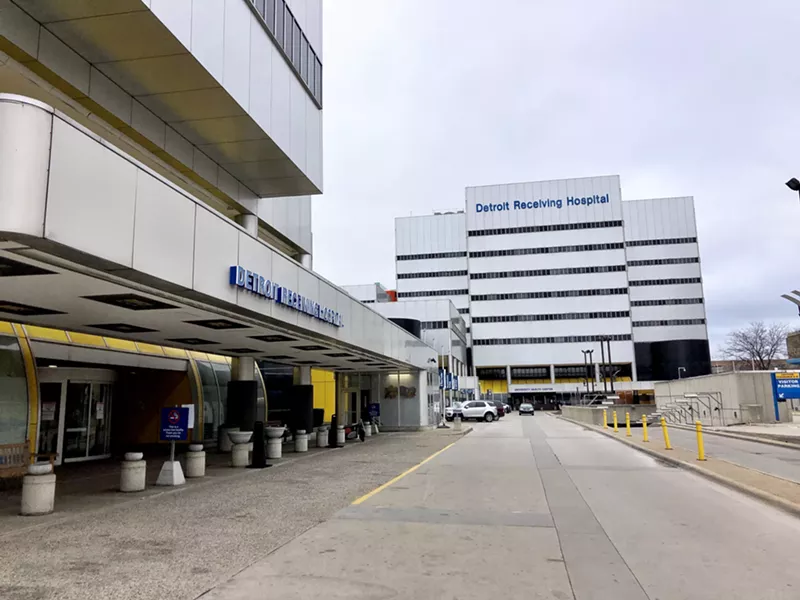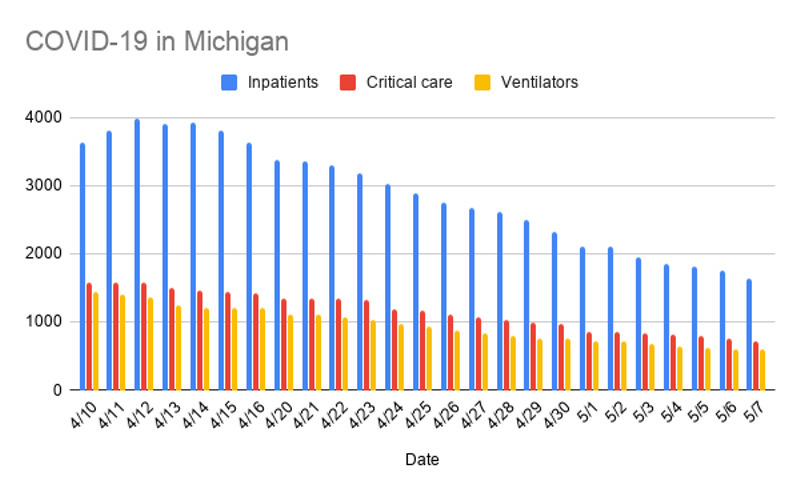Michigan shows strong signs of controlling the coronavirus as new cases, deaths continue to decline
Day by day, Michigan is slowly bending the coronavirus curve, with metro Detroit leading the way.
The state reported 93 new coronavirus deaths on Thursday, bringing the state’s total to 4,343. Michigan now has more than 45,600 confirmed cases, up 592 in the past 24 hours.
At the peak out of the outbreak in early and mid-April, metro Detroit accounted for 80% of the confirmed infections in the state. On Thursday, only a third of the new cases were in Wayne, Oakland, and Macomb counties.
But as the rate of new cases declines in metro Detroit, outbreaks are cropping up in western Michigan counties.
“We’re still seeing outbreaks across the state that is of concern,” Dr. Joneigh Khaldun, the state’s chief medical officer, said at a news conference Thursday.
In Kent County, the largest county outside of metro Detroit, the number of positive cases more than doubled in the past two weeks, from 906 to 2,076. Kalamazoo saw a similar increase, from 266 to 561. And in Ottawa County, the number of infections nearly doubled, from 167 to 331.
During the same period, Berrien and Muskegon counties each saw a 69% increase in cases.
By comparison, metro Detroit's new cases increased 14% in the past two weeks.
Gov. Gretchen Whitmer on Thursday extended her stay-at-home order through May 28, three days after Memorial Day. Even though the rates of new deaths and positive cases are declining, the daily numbers are still high and could flare back up if the state eases restrictions too quickly, the governor said during a news conference Thursday.
“The number of cases we’re seeing is starting to plateau because your staying at home is making a difference,” Whitmer said. “It’s terribly important that we don’t let our guard down, and we consider this a real threat because it is.”
Whitmer is slowly reopening the economy, beginning with the construction industry this week. She is phasing in manufacturing next week, but she cautioned it could be another two weeks before additional sectors reopen.
“It’s important that we remember that we re-engage like a dial, not like a switch we turn on and off,” Whitmer said. “This staged recovery is so critical. We have to continue to move incrementally and measure our data incrementally.”
One of the requirements to further ease restrictions is ensuring plenty of unused beds and ventilators are available at hospitals, which were overwhelmed in metro Detroit in early April. Over the past three weeks, the number of COVID-19 patients in the hospital has dropped by more than half, from 3,918 to 1,737. During the same period, the number of patients on a ventilator dropped 51%, from 1,212 to 596.
On Thursday, the field hospital at the TCF Center in downtown Detroit closed because it had no more patients. Designed to house as many as 1,000 COVID-19 patients, it never saw more than 14.
"At the time that it opened, we were on a straight line up," Mayor Mike Duggan said Thursday, pointing to a chart showing the city's peak of new cases in early April. "It was a very reasonable conclusion that we were going to need 1,000 more hospital beds."
Duggan called the closure "a point of great celebration" and "a remarkable accomplishment," proof that social distancing efforts worked to keep the virus at bay.
Another critical step to reopening the economy is an abundant capacity. The state's goal is to test 15,000 people a day to get a more accurate picture of the spread and catch early signs of outbreaks. In April, the state tested an average of 5,700 people a day. That number increased to 9,400 tests a day so far in May.
"We're ramping up testing significantly," Khaldun said.
Another sign of progress is the declining rate of people who are testing positive. In early April, about 40% of the tests were positive. That rate has dropped to 8%.
One troubling area is the state's prisons, where the number of new cases jumped from 485 to 2,036 in the past three weeks. During the same period, the number of deaths rose from 12 to 50. Inmates filed a federal class-action lawsuit last week, accusing the Michigan Department of Corrections of failing to adequately protect them.
Detroit reported 21 new coronavirus deaths on Thursday, pushing its total to 1,149. The city, which averaged 32 deaths a day in April, now has more than 9,500 confirmed cases. New York City and Detroit have the same number of COVID-19 deaths per capita — 170 per 100,000 residents.
More than 250 deaths were nursing home residents, Duggan said Thursday.
The city is now testing up to 1,500 people a day. The criteria has been expanded to include employees who are asymptomatic and returning to work.
"Right now things are going our way," Duggan said. "But if we decide to abandon with the warm weather the social distancing, we’ll need those beds at the TCF Center again. I’m hoping they are going to stay empty, but we have to be careful."
At the former Michigan State Fairgrounds, the city is testing roughly 1,500 people a day, including asymptomatic employees who interact with the public.
On Thursday, Wayne County reported 39 new deaths, bringing its total to 2,012. The county now has more than 17,600 positive cases, up 96 in the past day. In early April, the county was recording an average of 850 new cases a day.
In Oakland County, the number of deaths rose by 15, pushing its total to 789. The county now has 7,625, up 51 in the past day.
And in Macomb County, deaths rose from 662 to 678. The county now has 7,624 confirmed cases, up 43 in the past day.
Stay on top of Detroit news and views. Sign up for our weekly issue newsletter delivered each Wednesday.



